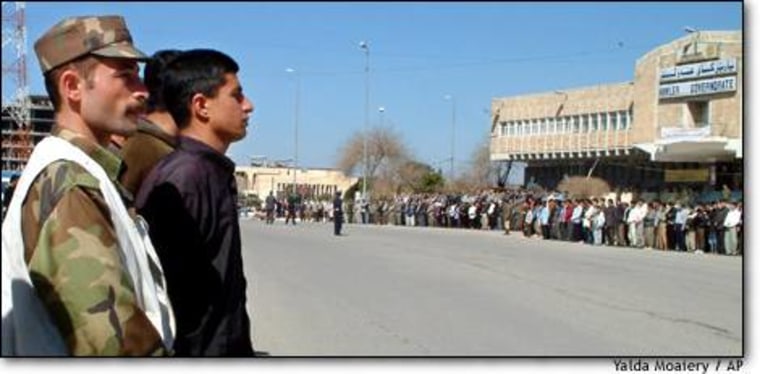Thousands in northern Iraq observed a moment of silence Sunday to commemorate the 15th anniversary of Saddam Hussein’s chemical attack on the Kurdish town of Halabja. Against the backdrop of an impending U.S.-led war to disarm the Iraqi leader of any remaining weapons of mass destruction like the ones used on Halabja, memorials here paid tribute to some 20,000 victims of the attack.
In Sulaimaniyah, a Kurdish city only 30 miles from the frontline with Saddam’s troops, black flags flew on buildings and car antennas. At precisely 11:20 a.m. local time (3:20 a.m. ET), traffic and pedestrians came to a standstill on an otherwise busy day.
The attack on March 16, 1988, is commemorated each year in the Sulaimaniyah province of Iraqi Kurdistan, where Halabja is located. But this year’s anniversary carried more weight, as the United States massed troops around Iraq for what is widely believed to be an imminent war to rid Baghdad of its alleged stockpiles of weapons of mass destruction.
Alwan Ali, who was nine when Saddam’s forces bombed her hometown with deadly VX and mustard gas, says she recalls the attack on Halabja like it was yesterday. “I can still hear the bomb that dropped in our backyard,” the 24-year-old said.
Immediate casualties of the attack numbered around 5,000, according to an independent investigation. Doctors here estimate a further 1,600 have died from long-term affects of the attack, and 15,000 suffer from complications caused by the chemical weapons.
The events in Halabja came during Saddam’s campaign to ethnically cleanse areas of minority Kurdish populations, during which villages were regularly subjected to chemical attack.
DAY OF COMMEMORATION
Several events Sunday commemorated the 15th anniversary of Halabja, including an art exhibition, a documentary film, poetry readings and a march by black-clad actors from a Sulaimaniyah theater.
Kurdish activists also presented 350,000 signatures gathered to support a letter to President Bush and British Prime Minister Tony Blair, the main supporters of military action to oust Saddam and destroy Iraq’s arsenals.
In his Saturday radio address, Bush said the Halabja attack “provided a glimpse of the crimes Saddam Hussein is willing to commit, and the kind of threat he now presents to the entire world.”
Although Iraq’s minority Kurds overwhelmingly support U.S. and British actions against Saddam, many fear the Iraqi leader will order his military to retaliate against the Kurds — long opposed to his rule — with chemical or biological weapons, repeating the massacre at Halabja.
The letter to Bush and Blair urged protection of the Kurds should war break out.
“Will we be assured that we will not be made to pay, or be sacrificed once more, for the sake of the interests and policies of international superpowers, or for those of neighboring countries?” the letter asked.
In recent weeks, Kurds have injected some criticism into their otherwise staunch support for the United States and its allies. While countries surrounding Iraq have taken steps to shield their civilian populations from chemical or biological attacks, in many cases with U.S. support, the Kurds lack even rudimentary protective equipment.
“We hear about our neighbors preparing for the war, but we have no such sophisticated or highly advanced equipment available for the protection of the people,” said Dr. Fouad Baban, a Kurdish physician noted for his research on the health of Halabja’s residents.
TRAGEDY LIVES ON
Fifteen years later, Halabja’s victims say they have not found closure on the events of March 16, 1988.
The afflictions suffered by thousands of Halabja residents — cancers, infertility, respiratory diseases, blindness and birth defects — are still visible on the victims.
Alwan Ali, who traveled from Halabja to Sulaimaniyah to attend the memorial events, labors to breathe. Her right arm hangs limp at her side, the result of nerve damage from Saddam’s weapons, she says.
I remember clearly the bomb exploding in our backyard,” she said. “Our mother got us all into the basement, but we didn’t know anything about these kinds of weapons.” Chemical agents are heavier than air, and the Ali family was not safe below ground.
But it was only hours later at nightfall, when the bombing eased, that Alwan and her parents and two siblings emerged from the basement and fled to the surrounding hills. Her younger brother has lost his vision as a result of the chemical attack. Fifteen years later, Alwan says her sister is “psychologically disturbed,” and unable to carry on a conversation with family members.
“Even the offspring of parents who have been exposed to chemical weapon are suffering from ill effects of chemical weapons,” said Baban. “And we don’t know how long this will last for the succeeding generations. Unfortunately, I think these illnesses will remain with them forever.”
(MSNBC.com’s Preston Mendenhall is on assignment in northern Iraq.)
